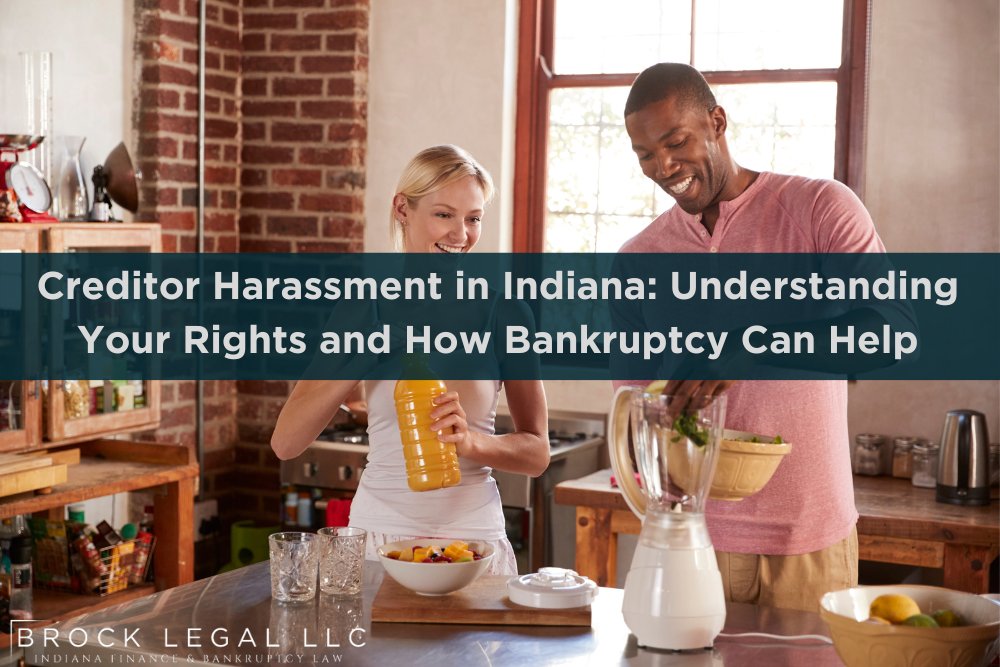Creditor Harassment in Indiana: Understanding Your Rights and How Bankruptcy Can Help
by Attorney S. Zachary T. Brock

Table of Contents
Introduction
For many in Indiana, creditor harassment can be an overwhelming and distressing experience. Constant calls, threatening letters, and legal actions such as lawsuits or wage garnishments are not just disruptive but can also lead to significant stress and anxiety. However, there are legal strategies, including bankruptcy law, that can provide protection and peace of mind.
Recognizing Creditor Harassment in Indiana
Creditor harassment is characterized by persistent and aggressive communication tactics used by creditors or collection agencies to recover debts. This may include repeated calls at unreasonable hours, use of abusive language, false claims about debts owed, or threats of legal action. Identifying these behaviors is essential to tackling them effectively.

Automatic Stay: Immediate Relief Through Bankruptcy
One of the most immediate protections offered by filing for bankruptcy in Indiana is the automatic stay. This legal provision comes into effect the moment you file for bankruptcy, ordering all creditors to cease their collection efforts. This halt applies to phone calls, letters, legal proceedings, and wage garnishments, offering a reprieve as you work towards resolving your financial issues.
Chapter 7 Bankruptcy: Discharging Unsecured Debts
Chapter 7 bankruptcy in Indiana provides a pathway to eliminate most unsecured debts, such as credit card and medical bills. This process, often known as liquidation, involves the selling of non-exempt assets to pay off debts. Importantly, the automatic stay that accompanies a Chapter 7 filing prevents creditors from continuing their collection actions during this time.
Chapter 13 Bankruptcy: Organizing Debt Repayment
For those with a regular income, Chapter 13 bankruptcy in Indiana allows the reorganization of debts into a manageable repayment plan, typically spanning 3-5 years. It’s an ideal option for individuals looking to retain significant assets like a home or car. During the repayment period, the automatic stay remains in effect, ensuring protection from creditor harassment.
Fair Debt Collection Practices Act (FDCPA): Protecting Consumers
The FDCPA is a federal law that sets limits on the behaviors of debt collectors. Prohibited actions under the FDCPA include calling outside of approved hours (8 a.m. to 9 p.m.), using deceptive or threatening language, or making false statements about the debt. Violations of the FDCPA can lead to legal recourse against the collector, including damages and attorney fees.
7. Indiana’s State-Specific Protections Against Debt Collectors
In addition to the FDCPA, Indiana has specific statutes governing debt collection practices. These laws further delineate what constitutes illegal collection behavior and offer additional layers of protection for consumers. For example, Indiana law prohibits collectors from engaging in conduct that can be seen as harassment or abuse, such as excessive calling or the use of profane language.
8. The Crucial Role of a Bankruptcy Attorney
Engaging with an experienced bankruptcy attorney can provide invaluable assistance. Not only can an attorney help navigate the complexities of bankruptcy filings, but they can also educate you on your rights under both federal and state laws. A skilled attorney can evaluate your situation, recommend the best course of action, and ensure your rights are protected throughout the bankruptcy process.
9. Proactive Steps to Address Creditor Harassment
While legal protections are vital, there are also proactive steps you can take to address creditor harassment. These include keeping detailed records of all communications with creditors, directly informing them of your intent to file for bankruptcy, and explicitly stating that all communication should go through your attorney. Being informed and prepared can make a significant difference in managing creditor interactions.

10. Creditor Harassment In Indiana Conclusion
Understanding your rights and the legal options available is crucial in handling creditor harassment in Indiana. Bankruptcy offers a legal framework to protect against aggressive collection tactics while allowing you to restructure or eliminate your debts. If you’re facing such challenges, consider reaching out to a knowledgeable bankruptcy attorney. At Brock Legal LLC, we are committed to guiding you through this process and helping you regain control over your financial life. Call us today for a free and confidential consultation. 317-203-9098
FAQs On Creditor Harassment in Indiana
Consulting with a bankruptcy attorney is crucial for understanding your rights and the best course of action for your specific situation. An attorney can guide you through the bankruptcy process, ensure creditors adhere to the automatic stay, and advise on potential FDCPA violations. They play a key role in protecting your rights and providing peace of mind during a challenging financial period.
If a creditor violates the FDCPA, you may have grounds to sue for damages, including emotional distress, lost wages, and attorney’s fees. Indiana’s state laws also provide additional protections, and a violation of these can lead to further legal recourse.
Once you file for bankruptcy, the automatic stay prohibits debt collectors from contacting you. Any further communication or collection efforts by creditors must go through the bankruptcy court or your attorney. Violation of this stay can result in legal consequences for the creditors.
Chapter 7 bankruptcy, often a liquidation process, discharges most unsecured debts and halts creditor actions through the automatic stay. Chapter 13, a reorganization form of bankruptcy, allows you to repay debts over time while keeping your assets. Both forms provide an automatic stay, but Chapter 13 typically involves a structured repayment plan over 3-5 years.
Filing for bankruptcy in Indiana triggers an automatic stay, which is a legal injunction that stops all collection efforts by creditors immediately. This includes halting phone calls, letters, lawsuits, and wage garnishments, offering significant relief while you work towards resolving your financial situation.
Creditor harassment in Indiana includes repeated and aggressive communication tactics like excessive phone calls, especially outside reasonable hours, use of abusive language, making false claims about debts, or threatening illegal actions. It also encompasses any behavior that violates the Fair Debt Collection Practices Act (FDCPA) or Indiana’s specific debt collection statutes.
Attorney S. Zachary T. Brock

Attorney S. Zachary T. Brock
Zach empowers individuals faced with financial challenges by providing them with effective solutions and unwavering support in the areas of consumer finance and bankruptcy law.
By actively listening and empathizing with each client, Zach works to gain a deep understanding of every individual or family’s unique circumstances. This helps him tailor his legal strategy to best meet the needs of each client.
“No matter what may be weighing you down financially, Brock Legal is here to help. My mission is to help navigate you through whatever stressful circumstance you may be faced with, by offering unparalleled education and service in the areas of consumer finance and bankruptcy law. Let us show you how our firm can help. Contact Brock Legal today!”
-Zach



